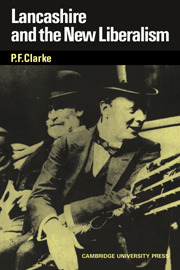Book contents
- Frontmatter
- Contents
- Preface
- Abbreviations
- Dedication
- PART ONE INTRODUCTION
- PART TWO FORMATIVE INFLUENCES
- 2 Manchester School to Tory Democracy
- 3 The Conservative Party at prayer
- 4 Cotton
- PART THREE THE TERMS OF THE CONTEST
- PART FOUR THE RECONSTITUTION OF LIBERAL LANCASHIRE
- PART FIVE FIELDS OF RECRUITMENT
- PART SIX GOING TO THE COUNTRY
- PART SEVEN CONCLUSION
- APPENDICES
- Bibliography
- Index
- Frontmatter
- Contents
- Preface
- Abbreviations
- Dedication
- PART ONE INTRODUCTION
- PART TWO FORMATIVE INFLUENCES
- 2 Manchester School to Tory Democracy
- 3 The Conservative Party at prayer
- 4 Cotton
- PART THREE THE TERMS OF THE CONTEST
- PART FOUR THE RECONSTITUTION OF LIBERAL LANCASHIRE
- PART FIVE FIELDS OF RECRUITMENT
- PART SIX GOING TO THE COUNTRY
- PART SEVEN CONCLUSION
- APPENDICES
- Bibliography
- Index
Summary
I cannot too strongly emphasise the fact that the cotton trade is the mainstay of all who make their living within a radius of 40 miles from Manchester, no matter what their occupation may be.
Charles Macara, 1906The localisation of the cotton industry remained extraordinarily static. Although it was totally dependent upon imported raw materials, it was not pulled towards its major port; instead, with the completion of the Manchester Ship Canal in 1894, the port moved to the industry which kept to the grits and coal-measure sandstones of Rossendale and the Pennines. Despite favourable humidity, cotton mills were of minimal importance in the area around Liverpool bounded by Southport, St Helens and Warrington. Like mining, the industry was concentrated in definite centres which it dominated. Only two large towns were shared by coal and cotton – Burnley was a cotton town with coal, Wigan a coal town with cotton. And in Wigan few men were employed in textiles; not only was the industry carried on there almost exclusively by women but, unlike a cotton town proper, almost exclusively by single women. The miners sent their daughters but not their wives to the mill. The extent of female employment was, indeed, a good index of the extent to which a town depended upon cotton. In 1901 and 1911 alike around three–quarters of unmarried women in the spinning and weaving towns were at work.
- Type
- Chapter
- Information
- Lancashire and the New Liberalism , pp. 76 - 100Publisher: Cambridge University PressPrint publication year: 1971



